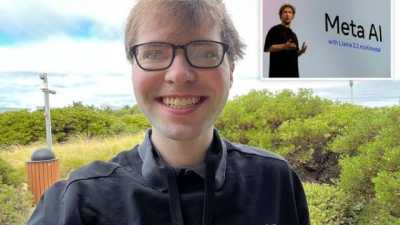Meta Offers $250M Deal to 24-Year-Old AI Prodigy: ‘Revenge of the Nerds’ Has Peaked
In a jaw-dropping move that underscores the growing arms race in artificial intelligence, Meta has offered a $250 million compensation package to 24-year-old AI researcher Matt Deitke — one of the largest known offers in tech history.
Deitke, a standout talent who recently dropped out of a Ph.D. program at the University of Washington, initially rejected Meta’s offer of around $125 million over four years. But after a personal meeting with CEO Mark Zuckerberg, the offer was doubled — including a potential $100 million in the first year — leading the young scientist to accept.
“When computer scientists are paid like professional athletes, we’ve reached the climax of ‘Revenge of the Nerds,’” said MIT economist David Autor.
Deitke’s rise reflects the escalating value of top-tier AI talent. After leaving academia, he joined the Allen Institute for AI in Seattle, where he led development on Molmo, a cutting-edge multimodal chatbot. He later co-founded Vercept, a startup building autonomous AI agents, which raised $16.5 million from high-profile investors including former Google CEO Eric Schmidt.
His innovations in 3D datasets, embodied AI, and multimodal systems earned him accolades like an Outstanding Paper Award at NeurIPS 2022 — placing him among the elite in the AI research community.
Meta’s aggressive courtship of Deitke is part of a broader strategy. The company has already spent over $1 billion recruiting top AI talent, including former Apple AI head Ruoming Pang, reportedly offered over $200 million. Meta's capital expenditures are expected to surge to $72 billion next year as it expands its Superintelligence Lab.
But while Silicon Valley celebrates these mega-deals, critics are sounding alarms.
“This type of AI investment deepens inequality,” said Ramesh Srinivasan, a UCLA professor and founder of the Digital Cultures Lab. “Tech giants are throwing hundreds of millions at a few elite researchers while cutting thousands of lower-wage jobs — many of which are now being replaced by the very AI systems they’re funding.”
Srinivasan warned that AI is already automating cognitive jobs — from HR and paralegal work to rideshare driving — all based on data generated by real workers who are now being pushed out. “If a job can be reduced to data, it can be automated,” he said. “And the income tied to those jobs is at risk.”
He also criticized proposals like universal basic income as inadequate: “UBI gives you money, but it doesn’t pay you for the data you helped generate. That’s the root of the problem.”
In an investor call, Zuckerberg defended the strategy, saying Meta is building a “talent-dense” team to lead in AI. “If you’re going to spend hundreds of billions on compute,” he said, “you need the 50 or 70 best researchers in the world. There’s just an absolute premium for the most talented people.”
Meta declined further comment, referring inquiries to Zuckerberg’s statement.
